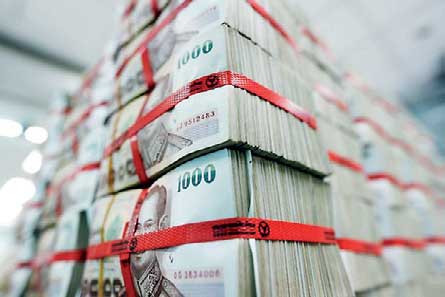Wednesday Feb 25, 2026
Wednesday Feb 25, 2026
Tuesday, 30 January 2018 00:00 - - {{hitsCtrl.values.hits}}
Reuters: Asian currencies consolidated recent strong gains on Monday, starting the week on a subdued note against the dollar as the US currency made little headway after faltering over the past month.
The dollar was marginally higher against a basket of currencies, supported by a rise in US bond yields, but showed no signs of recovering from a three-year low set last week.
“At this point, given the strength they (Asian currencies) had last week, we’re seeing some consolidation and profit taking today,” said Khoon Goh, head of Asia research at ANZ Banking Group.
“US 10-year bond yields are also pushing higher, which is providing some support the dollar, hence the slight retracement in Asian currencies.”
Goh expects the regional currencies to continue trading sideways ahead of this week’s Federal Reserve policy meeting and President Donald Trump’s State of the Union address.
Asian currencies have had a largely strong showing so far this year, underpinned by a broadly weaker dollar which has been pressured by its receding yield advantage and worries about the Trump administration’s protectionist trade policies.
On the day, the Philippine peso shed nearly 0.4% against the dollar. The country is bracing for a possible three-month-long emergency in areas around an erupting volcano, which has already displaced more than 81,000 and caused overcrowding at temporary shelters, the country’s disaster agency said on Friday.
Elsewhere, moves were modest. The Indonesian rupiah fell about 0.2% against the dollar, while the Thai Baht edged up to a more than four-year high on the greenback.
The Thai currency has benefited from the dollar’s woes.
Thailand’s central bank governor said last week that policy makers are concerned that a strong baht might hurt the economy and is ready to consider additional measures if moves in the currency are ‘unusual.’
Asian FX Positioning
Investors have raised their long positions on most Asian currencies, a Reuters poll showed last week.
The Philippine peso saw sentiment reverting to bearish territory from neutral, while bullish bets on the Chinese yuan were raised to their highest since September 2010.
Sentiment in the Malaysian ringgit was boosted to the strongest since March 2008 on expectations the country’s central bank will raise interest rates.
LONDON (Reuters): The dollar edged higher against a basket of currencies on Monday, helped by rising bond yields and a week packed with US data starting with a central bank policy decision, though the broader outlook remained murky for the greenback.
Conflicting signals from top US officials last week did little to discourage bearish positions, with net short dollar bets increasing to their highest level since October, according to latest positioning data. The dollar is set to post its biggest monthly decline since March 2016.
“The dollar is getting some help from higher US yields and we have the Fed and the jobs data this week, but the broader story remains selling the greenback into any rallies,” said Alvin Tan, a currency strategist at Societe Generale in London.
Against a basket of currencies, the dollar bounced a quarter of a% higher to 89.30 after scoring six consecutive weeks of losses.
On a monthly basis it is set to fall 3%.
Over the last decade, including the global financial crisis in 2008, it has fallen only 10 times by that extent, according to Thomson Reuters data.
The greenback is also losing its relative yield attraction for investors. Short-term interest rates are expected to rise in other countries as the European Central Bank and many others start to scale back their easy monetary policy.
Against the yen, the dollar was up 0.3% to trade at 108.95 yen, after hitting a low of 108.28 yen on Friday, its lowest level since mid-September.